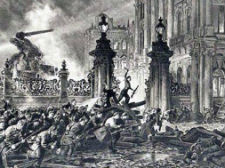On This Day
On This Day, 21 May 1917
On 21, May 2017 | In On This Day | By Nicola Gauld
Birmingham Daily Post
Monday 21 May 1917
THE RUSSIAN REVOLUTION
BIRMINGHAM CONGRATULATIONS.
There was a large gathering in the Birmingham Town Hall last evening at a meeting promoted by the Birmingham Trades Council for the purpose of congratulating Russian people upon the success of the revolution. The chair taken by Mr. F. W. Rudland (president of the Trades Council), and the company included representatives of various British, Russian, Polish, and Belgian democratic organisations. The Chairman urged that the time had come for a decisive struggle against the conquest aspirations of the Governments of all countries, and for the people of each nation to take into their own hands decisions to war and peace.
Councillor Harrison Barrow proposed a resolution congratulating the Russian people on the success of the revolution and their emancipation from Czardom and its evil role, and earnestly hoping that everywhere tyranny and oppression might be dealt with similarly in order that the democracy of the world might be united in the work of securing the peace, happiness, and progress of humanity. The only way of ensuring peace in the world, he said, was to secure democratic control and see that it was enforced in all countries throughout Europe. If they were not to doom civilisation entirely they would have to do away with war and the war spirit. He did not believe that the idea of crushing Germany had any other effect except make German Socialists support the continuance of war, while the idea of economic strangulation had a similar effect. They must, he urged, get rid of some of the present people in the Government—(hear, hear) —who were not helping them, and see that they got democratic government and followed the lead of Russia.
Mr. F. Spiers seconded the resolution, which was carried unanimously. Mr. Victor Alter (representing Russian Socialist groups) declared that the true cause of the revolution was the internal situation which had arisen under Czardom and autocracy. Such a system was opposed to the development of democracy, and it was, therefore, impossible in any modern country.
Dr. Louis O. Segal (Professor of Russian at Birmingham University) remarked that complaint had been made of the talking in Petrograd whilst men were dying in France. But if the Czar succeeded in re-establishing his power to-morrow other countries would not come to the help of the Russian democracy. The Russian people had two aims, to organise for the prosecution of the war, and organise its liberty, because other nations would not help them if that was endangered. “If,” said the speaker,” you are true to the Russian democracy, you can be certain they will not betray you in the fight against Prussianism.”



